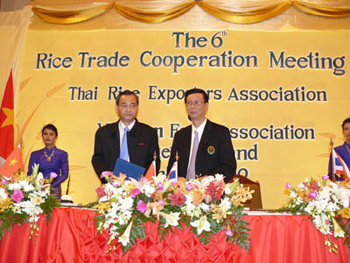Thai and Vietnamese rice exporters have signed an agreement to tighten co-operation in rice trade and beef up their bargaining power in global markets.

The essence of the memorandum of understanding agreed to at talks between representatives of the Thai Rice Exporters Association and Vietnam Food Association last week was to standardise sale contracts to provide fairer deals for rice exporters.
"Currently, importers have more say in sale contracts, which contain some conditions that are not fair to us," said Chookiat Ophaswongse, president of Thai Rice Exporters Association.
For instance, they demand contracts include a 5% plus-or-minus system for rice delivery volume, which is a burden for exporters.
The condition means exporters are required to ship out up to 10,500 tonnes for a buying order of 10,000 tonnes of rice, while importers can take only 95,000 tonnes if they want, according to Mr Chookiat.
"Once the rice reaches the buyer's port, they are eligible to accept a lower amount than ordered if market prices changed," he said.
Vietnamese traders shoulder an even higher burden of 10% plus or minus in contracts.
"This condition has been used for many decades, following grain loss via sea transport, mostly delivered in bulk. But these days, this problem is minimal," he said.
The talks in Phuket last week were the sixth between the world's two leading rice-exporting countries, aimed at strengthening their export competitiveness through closer co-operation. A working group has been formed to work on details.
According to Mr Chookiat, rice exports for the two countries should account for nearly 15 million tonnes this year, or half the global rice trade. Vietnam recently increased its export forecast to 6 million tonnes from 5 million as a favourable climate has improved output.
Thailand plans to sell about 8 million tonnes of rice this year, lower than the 10 million it shipped in 2008. Thailand produces 20 million tonnes of milled rice per year, with 10 million for domestic consumption. Vietnam produces 25 million tonnes per year, of which 20 million are consumed locally.
Source: Bangkok Post
|